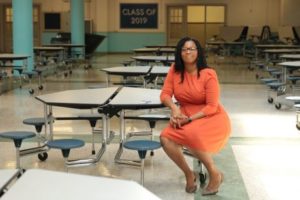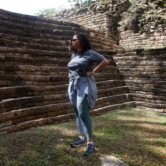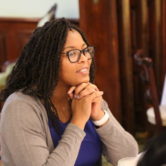
REINVENTING AMERICA’S SCHOOLS
Towana Pierre-Floyd
Founder & School Leader, KIPP Renaissance Early College Academy New Orleans
I’m a product of the New Orleans Public School system, a very proud product. I know that sometimes the story we tell of New Orleans education before Katrina is a really negative one, but there were incredible teachers, incredible schools here far before I got here, whose shoes I stand in and whose shoulders I’m standing on. This work matters so much to me because this is home. This is the place where any opportunities I’ve gotten really came from, and so the opportunity to give those opportunities back to my students matters so much. I think beyond that, the history of this city is so rich and incredible and people of color have meant so much to this city, especially when you talk about the music and the food and the history.
So being able to have our kids not just learn math and science and get a traditional education, having them be able to understand, appreciate and know the history of this city, their history in a way that we don’t always prioritize in our country, so that they are understanding that they’re not starting from scratch. They’re not building something that hasn’t been done, they’re actually themselves building on the shoulders of giants and becoming legends because of all the legends of New Orleans who were here before matter so much.
I think New Orleans, actually, even when we’ve not acknowledged it as a country, has always been on the forefront of change. When we talk about the Civil Rights movement, we often talk about Selma, we talk about Martin Luther King, all of whom are incredibly important, but we ignore the absolutely essential role that New Orleans played.
I think New Orleans similarly is at the forefront of what it means to rethink education in this country. We’ve got some things figured out and we need to actually move on to being able to say, “This is what works, this is what we know should be available to all kids in all schools across the country.” And the country has a responsibility to look to New Orleans to support these efforts because if we do this right, we can change what it means to be an educated person in the United States of America and have that be more than just again getting that math and ELA credit, but understanding the history of this super-complicated, super-rich history of this country in a way that makes us all better.

Traveling to the African Diaspora to prepare Black students for college
A charter school principal wants more of her Black students to stick with college. So she’s taking them to places in the African Diaspora to show how Black people have persisted and succeeded in the face of adversity.
Towana Pierre-Floyd said we’d reach the ocean soon. We’d flown over the Gulf of Mexico on our way from New Orleans to Belize, then boarded a bus south. Outside, the road was dust, pocked by craters our chartered bus swerved to miss, but Pierre-Floyd said she could sense it: the Caribbean Sea was close. It was mid-May, technically the first week of Pierre-Floyd’s summer vacation, but she was the kind of high school principal who preferred spending her first days of freedom with students. Pierre-Floyd stood up, stretched her arms above her 5′9′′ frame, then looked back at the two dozen teenagers she’d brought with her to Central America. Most were already lost in their own worlds, sleeping against the bus windows, or staring at their phones, futilely willing Wi-Fi to appear. Only Endiah Guyton, a fifteen-year-old who’d chosen to sit next to Pierre-Floyd for the three-hour bus ride, was still paying attention. Pierre-Floyd sat back down and turned to Endiah.
“We’re about to be on the beach,” Pierre-Floyd told her. “I’m so excited.”
Endiah groaned. She closed her eyes and imagined the sea and the sand she knew would sneak into everything. She worried the waves would undo the soft curls she’d formed into a perfect bun she called “the puff.” What if seaweed scratched her ankles? She opened her eyes, then leaned across the aisle to talk to me.
“I’m not trippin’,” she said. “Salt water is just not my thing.”
Endiah looked out the window for a while, studying the palm trees and wood-frame houses as they blurred by. After half an hour, the landscape no longer surprised her, so Endiah bent back toward me and asked a dozen questions.
“What is your favorite color for eyes?” she asked me. “Do you prefer the major or the minor key? What was college like for you? Do you keep your cell phone bright or dim? Do you watch The Vampire Diaries? What is your best friend’s name? What is this article about?”
I wasn’t sure how to explain to a rising high-school junior why I’d followed her and her classmates to Belize. I’d met Pierre-Floyd a few months before during a tour of Frederick A. Douglass High School, the Ninth Ward charter school where she works, and she’d told me, in passing, that she planned to take twenty-five kids to Belize. Pierre-Floyd said she’d been the first in her family to graduate from college and she thought a high school trip she’d taken to Ghana had helped her earn a degree. She wanted to give her students the same experience.
After the tour, I couldn’t stop thinking about the upcoming trip. Pierre-Floyd and I are the same age. Like her, I was the first in my family to go to college. (Pierre-Floyd is Black, and I am white.) I grew up poor in Monroe, Louisiana, and while richer kids went to Paris and Amsterdam during summers, I spent mine in Monroe, circling the beige, one-story Pecanland Mall with no money to spend. None of Pierre-Floyd’s students were rich. Most came from families whose incomes were low enough that the teenagers qualify for free or reduced-price lunch. And yet, they wouldn’t have to feel that they were the only ones who’d never been anywhere. They would show up to college with passports, with blue-circle stamps marked Belize.

A Conversation With Principal Towana Pierre-Floyd
EXCERPTS FROM OUR RADIO INTERVIEW WITH PATRICK DOBARD
On Mondays at 12:30pm, Patrick Dobard, CEO of New Schools for New Orleans, hosts “Talking NOLA Schools” on WBOK 1230 AM. In June, he spent the show talking with Frederick A. Douglass High School principal Towana Pierre-Floyd.
In their conversation, Ms. Pierre-Floyd discussed the legacy of New Orleans’ schools, helping students process racial violence, and the way Douglass nurtures “Black girl magic” and “Black boy joy,” and more. We share some of her thoughts here, and you can catch the full interview here .